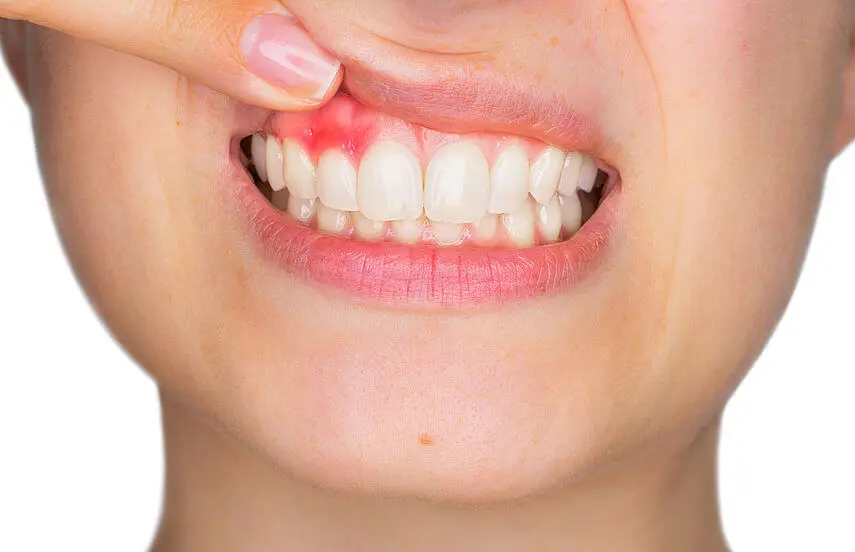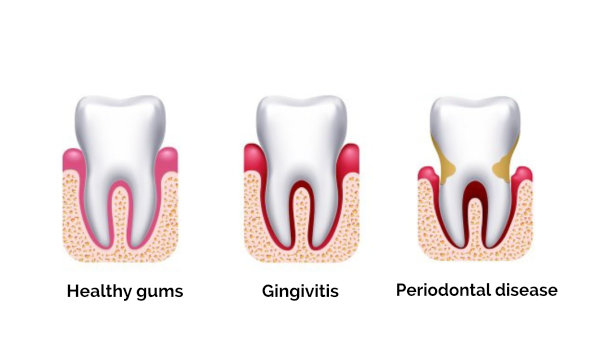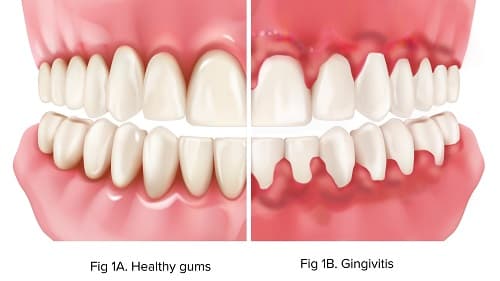Do your gums bleed? Here’s what you need to know about gingivitis

Did you know that 8 out of 10 people over the age of 35 have some form of gum disease? Gum health is important because healthy gums provide firm and effective support for the teeth, don’t bleed, and don’t become inflamed. If your gums bleed during brushing, if your gums are red, inflamed, or even painful, you may be suffering from gingivitis.
 What is gingivitis?
What is gingivitis?
Gingivitis is a superficial inflammation of the gums and represents the first stage of periodontal disease. The most common cause of gingivitis is poor oral hygiene, which encourages the formation of plaque on the teeth, leading to inflammation of the surrounding gum tissues.
Unlike the next stage, periodontitis, gingivitis is reversible. If left untreated, it can progress to more serious conditions and may even lead to tooth loss.
What are the causes of gingivitis?
The most common cause of gingivitis is poor oral hygiene, which encourages the buildup of bacterial plaque.
Plaque is a sticky, invisible film primarily made up of bacteria that forms on the teeth when starches and sugars from food interact with bacteria naturally found in the mouth. It needs to be cleaned daily, as it reforms quickly and can harden below the gum line into tartar, where it collects bacteria.
Tartar makes plaque harder to remove, acting as a protective shield for the bacteria and causing irritation along the gum line. Tartar must be removed by a dentist. The longer plaque and tartar remain on the teeth, the more they irritate the gums and the area

Risks
Untreated gingivitis can progress to a more serious gum disease that spreads to the underlying tissue and bone (periodontitis), a much more severe condition that can lead to tooth loss.
Chronic gum inflammation is also associated with other diseases, such as respiratory diseases, diabetes, stroke, or rheumatoid arthritis.
How to prevent and treat it?
The most common cause of gingivitis is poor oral hygiene. Good dental care habits, such as brushing at least twice a day, using dental floss daily, and having regular dental checkups, can help prevent and stop gingivitis.
Twice a year, it is recommended to have a professional dental cleaning and scaling to remove tartar and clean bacterial plaque. This habit will help you avoid dental deposits and gum irritation.
Related Posts
Latest articles:
All-on-4 vs All-on-6 Implants: Which Full Smile Solution Is Right for You?
admin2025-11-12T15:22:53+02:00
If you’ve been living with missing or severely damaged teeth, you’ve probably heard about All-on-4 and All-on-6 implants, two of the most effective ways to restore a full, permanent smile. But what’s[...]
Do your gums bleed? Here’s what you need to know about gingivitis

Did you know that 8 out of 10 people over the age of 35 have some form of gum disease? Gum health is important because healthy gums provide firm and effective support for the teeth, don’t bleed, and don’t become inflamed. If your gums bleed during brushing, if your gums are red, inflamed, or even painful, you may be suffering from gingivitis.
 What is gingivitis?
What is gingivitis?
Gingivitis is a superficial inflammation of the gums and represents the first stage of periodontal disease. The most common cause of gingivitis is poor oral hygiene, which encourages the formation of plaque on the teeth, leading to inflammation of the surrounding gum tissues.
Unlike the next stage, periodontitis, gingivitis is reversible. If left untreated, it can progress to more serious conditions and may even lead to tooth loss.
What are the causes of gingivitis?
The most common cause of gingivitis is poor oral hygiene, which encourages the buildup of bacterial plaque.
Plaque is a sticky, invisible film primarily made up of bacteria that forms on the teeth when starches and sugars from food interact with bacteria naturally found in the mouth. It needs to be cleaned daily, as it reforms quickly and can harden below the gum line into tartar, where it collects bacteria.
Tartar makes plaque harder to remove, acting as a protective shield for the bacteria and causing irritation along the gum line. Tartar must be removed by a dentist. The longer plaque and tartar remain on the teeth, the more they irritate the gums and the area

Risks
Untreated gingivitis can progress to a more serious gum disease that spreads to the underlying tissue and bone (periodontitis), a much more severe condition that can lead to tooth loss.
Chronic gum inflammation is also associated with other diseases, such as respiratory diseases, diabetes, stroke, or rheumatoid arthritis.
How to prevent and treat it?
The most common cause of gingivitis is poor oral hygiene. Good dental care habits, such as brushing at least twice a day, using dental floss daily, and having regular dental checkups, can help prevent and stop gingivitis.
Twice a year, it is recommended to have a professional dental cleaning and scaling to remove tartar and clean bacterial plaque. This habit will help you avoid dental deposits and gum irritation.
Related Posts
Ultimele articole:
All-on-4 vs All-on-6 Implants: Which Full Smile Solution Is Right for You?
admin2025-11-12T15:22:53+02:00
If you’ve been living with missing or severely damaged teeth, you’ve probably heard about All-on-4 and All-on-6 implants, two of the most effective ways to restore a full, permanent smile. But what’s[...]
Bruxism: how to stop teeth grinding and protect your smile
admin2025-08-21T15:38:22+03:00
Have you ever felt constant tension in your jaw or noticed increased tooth sensitivity? These could be signs of bruxism—a common but often overlooked condition involving involuntary teeth grinding or clenching. What[...]
3 Reasons why it’s not too late to get braces
admin2025-01-16T13:47:05+02:00
Some adults believe they have missed the right age for braces, viewing this treatment as suitable only for children and teenagers. If you are among this group, know that orthodontic treatment can[...]




















